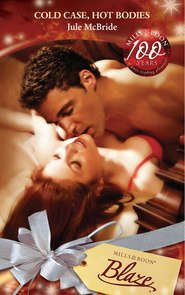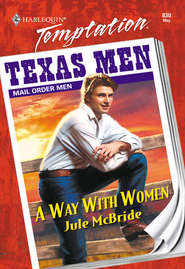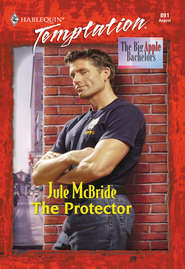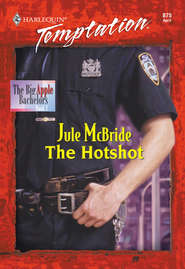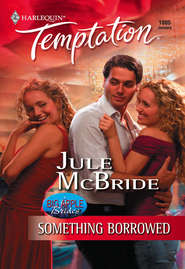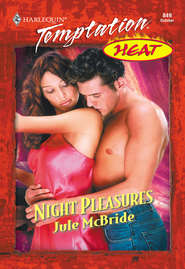По всем вопросам обращайтесь на: info@litportal.ru
(©) 2003-2025.
✖
The Pleasure Chest
Автор
Год написания книги
2018
Настройки чтения
Размер шрифта
Высота строк
Поля
The Pleasure Chest
Jule McBride
Is she dreaming?New York artist Tanya Taylor is amazed—and incredibly turned on—when real-life pirate Stede O'Flannery magically appears in her bedroom ready for action. The dark-haired, green-eyed, sexy seafarer is shirtless, strapped with a sword—and those breeches?They leave nothing to Tanya's naughty imagination. But he looks just like the subject in the wild and mysterious old painting she's just bought. The truth is Stede has one week to break a fateful curse. He's got to fall in love—and fast.Good thing Tanya, with her chestful of toys, knows the most pleasurable ways to a man's heart. After all, doesn't she deserve something deliciously wicked out of the deal, too?
THE PLEASURE CHEST
Jule McBride
TORONTO • NEW YORK • LONDON AMSTERDAM • PARIS • SYDNEY • HAMBURG STOCKHOLM • ATHENS • TOKYO • MILAN • MADRID PRAGUE • WARSAW • BUDAPEST • AUCKLAND
In loving memory of my favorite person in the world, my great-aunt, Carrie Winifred Dunlap, 1917–to eternity in the hearts of others.
And to the man who helped her so much, and thought of those beautiful yellow roses, her best friend, George “Bono” Hall.
Contents
Prologue
Chapter 1
Chapter 2
Chapter 3
Chapter 4
Chapter 5
Chapter 6
Chapter 7
Chapter 8
Chapter 9
Chapter 10
Chapter 11
Chapter 12
Chapter 13
Coming Next Month
Prologue
New York, 1791
“PUT AWAY YER MUSKET, Basil Drake, and say you won’t be shootin’ me today,” called Stede O’Flannery. He hazarded a glance from behind the trunk of an oak, squinting green eyes that Basil’s fiancée, Lucinda, had vowed were the color of sunlit shamrocks. He shook his head, unable to believe Basil had brought a smoothbore musket to the woods, a sixty-nine caliber French Charleyville by the looks of it, equipped with a bayonet. So much for using comparable weapons. Stede only had a flintlock pistol.
“Show yourself, O’Flannery,” yelled Basil. “You’re a damn rascal, and I insist on this interview.”
Oh, Sweet Betsy Ross, Stede thought grumpily. Raising his voice, he shouted, “I didn’t dishonor Lucinda!”
“You were caught red-handed in her bedchamber, man!”
Literally, since he’d been lying on top of her, unlacing her bodice with wind-chapped fingers.
“She was shivering, O’Flannery!”
With cold, though, not sexual need. She’d been drenched from the plunge she’d taken into the freezing Hudson River, after saying she’d sooner kill herself than marry Basil. Not that anyone had bothered to credit Stede with saving her life. “No good deed goes unpunished,” he mused. When Basil’s voice sounded again, Stede pushed aside a vision of blond tresses trailing over creamy bare bosoms.
“You’re a no-account scoundrel!”
True. But could Stede help it if war had made him wealthy? Or if his reputation excited women more than when they entertained bores like Basil? Or if, in addition to being a privateer, he could paint landscapes that came alive and made ladies swoon? Besides, Lucinda was his patroness, nothing more. One of many. Because Stede’s own mama, rest her soul, had been Lucinda’s nurse, he’d known Lucinda for years. It was she who’d encouraged him to paint, claiming that fruits in his still lifes made her mouth water as if from a lover’s kiss. But who was her lover? After reading her private letters, Basil had assumed Stede was the man.
“Maybe I should kill you now and be done with it, Basil.”
“It’s you they’ll carry from here in a pine box!”
“Doubtful.” Dueling was illegal in New York, so they’d crossed the river to Jersey, and now Stede glanced where early morning fog was rolling from the Hudson’s choppy waters, looking as thick as pipe smoke. Because he was tall, slender, blond and clothed in white, Basil looked ethereal, like an unlit taper in the shadowy dawn. Neither he nor Stede had brought seconds. This way, Stede had figured Basil could back down without losing face. Basil had claimed the same, but judging by how he’d handled himself on fox hunts with Lucinda’s father, General Barrington, Stede knew Basil couldn’t shoot his way out of a burlap sack, not even with a good musket.
“C’mon, Basil. I really don’t want to kill you on this fine mornin’.” Not that it would be any great loss. The officious fool was twice Lucinda’s age, but her father had been impressed by his supposed good name and rumored inheritance. Meantime, Stede heard the family had fled to the colonies years ago to escape Basil Senior’s gaming debts. Well, Stede thought, as Poor Richard always said, “Light purse, heavy heart.” Maybe debting accounted for Basil’s lack of decent humor.
“Show yourself, O’Flannery!”
Stede’s trigger finger itched on his pistol. Truth was, every fellow who drank in McMulligan’s would thank Stede for killing Basil. “He who drinks fast, pays slow,” said Stede, voicing another Poor Richard-ism. It was why Mark McMulligan hated Basil even more than Lucinda did. Stede sighed. The revolution might be over, but hatred lasted forever. Even now, a fleet was in New York harbor, and captains were ready with letters of marque that would allow them to intercept merchant vessels for plunder. While Stede could board any one of them tonight and escape Basil’s wrath, not to mention General Barrington’s, he’d buried war booty nearby on Manhattan Island; some of it was hard-won by his father, rest his soul, and Stede had hoped to use the treasure to build a home and settle down.
“Is that too much for a man to ask?” he exploded, sensing that his dreams were going up in smoke. Damn if this situation wasn’t about as welcome as the Stamp Act. What had that fellow, Rousseau, said? Yes…“Man’s born free, but everywhere in chains.”
“When they’re not conscripting you into somebody else’s army,” he muttered, “a bunch of jealous suitors and worried papas start gunning for you.”
Long moments passed. As usual. Duels took forever. A man could sail to China and back before they were over, which was why Stede preferred pub brawls any day.
Leaves rustled. Birds took flight. In the silence, his heart ticked like a clock, saying it was too early to be in the woods on a cold morning when he could be tucked in his cot above McMulligan’s with some sweet serving wench. Tired of waiting, he stepped from behind the oak, deciding he’d better throw away his fire. Yes, he’d offer a delope, which is what Basil would call it, since he insisted on using all the latest fancy French dueling terminology.
Slowly, so Basil could see, Stede stepped fully into view and raised his arm, pointing the pistol skyward. The autumn air was misty, but sharp, carrying scents of winter. Colors burst inside his mind, and for a second, he imagined painting a picture of the russet and gold canopy of leaves. He’d make the trees look like uniformed soldiers surrounding the foggy clearing, preparing to march to a massacre across a soft blur of grass. Yes, the red leaves were redcoats….
He squeezed the trigger.
The retort was swift, the blast threatening to knock him back a pace, but he stood firm.
“Ah. So you concede!” yelled Basil. Grandly Basil pushed aside his waistcoat, then prepared to shoulder his musket while striding forward to shake hands. Good. Stede would rather swallow a spoonful of his pride than prolong this idiocy. At twenty paces, Basil stopped, a glint in his eyes that Stede could see even at this distance. Suddenly Basil released a war whoop and charged, coming at a dead run. If the ball didn’t kill Stede, the bayonet mounted to the musket barrel surely would.
“Bloody bastard!” Stede gasped, pivoting and darting toward the woods. He’d conceded by shooting skyward, but Basil was going to kill him, anyway! And there was no time for Stede to reload. He’d brought no witnesses. “Lout!” Stede shouted as Basil closed the distance.
He whirled in time to see Basil aim at his heart, then hit the dirt as Basil fired. Boom! Air whooshed overhead as a bullet passed, then another blast sounded, but from where? Basil hadn’t had time to reload, either. Now he shrieked and dropped his pistol. He was hit! Someone had fired at Basil from the trees. Who?
Jule McBride
Is she dreaming?New York artist Tanya Taylor is amazed—and incredibly turned on—when real-life pirate Stede O'Flannery magically appears in her bedroom ready for action. The dark-haired, green-eyed, sexy seafarer is shirtless, strapped with a sword—and those breeches?They leave nothing to Tanya's naughty imagination. But he looks just like the subject in the wild and mysterious old painting she's just bought. The truth is Stede has one week to break a fateful curse. He's got to fall in love—and fast.Good thing Tanya, with her chestful of toys, knows the most pleasurable ways to a man's heart. After all, doesn't she deserve something deliciously wicked out of the deal, too?
THE PLEASURE CHEST
Jule McBride
TORONTO • NEW YORK • LONDON AMSTERDAM • PARIS • SYDNEY • HAMBURG STOCKHOLM • ATHENS • TOKYO • MILAN • MADRID PRAGUE • WARSAW • BUDAPEST • AUCKLAND
In loving memory of my favorite person in the world, my great-aunt, Carrie Winifred Dunlap, 1917–to eternity in the hearts of others.
And to the man who helped her so much, and thought of those beautiful yellow roses, her best friend, George “Bono” Hall.
Contents
Prologue
Chapter 1
Chapter 2
Chapter 3
Chapter 4
Chapter 5
Chapter 6
Chapter 7
Chapter 8
Chapter 9
Chapter 10
Chapter 11
Chapter 12
Chapter 13
Coming Next Month
Prologue
New York, 1791
“PUT AWAY YER MUSKET, Basil Drake, and say you won’t be shootin’ me today,” called Stede O’Flannery. He hazarded a glance from behind the trunk of an oak, squinting green eyes that Basil’s fiancée, Lucinda, had vowed were the color of sunlit shamrocks. He shook his head, unable to believe Basil had brought a smoothbore musket to the woods, a sixty-nine caliber French Charleyville by the looks of it, equipped with a bayonet. So much for using comparable weapons. Stede only had a flintlock pistol.
“Show yourself, O’Flannery,” yelled Basil. “You’re a damn rascal, and I insist on this interview.”
Oh, Sweet Betsy Ross, Stede thought grumpily. Raising his voice, he shouted, “I didn’t dishonor Lucinda!”
“You were caught red-handed in her bedchamber, man!”
Literally, since he’d been lying on top of her, unlacing her bodice with wind-chapped fingers.
“She was shivering, O’Flannery!”
With cold, though, not sexual need. She’d been drenched from the plunge she’d taken into the freezing Hudson River, after saying she’d sooner kill herself than marry Basil. Not that anyone had bothered to credit Stede with saving her life. “No good deed goes unpunished,” he mused. When Basil’s voice sounded again, Stede pushed aside a vision of blond tresses trailing over creamy bare bosoms.
“You’re a no-account scoundrel!”
True. But could Stede help it if war had made him wealthy? Or if his reputation excited women more than when they entertained bores like Basil? Or if, in addition to being a privateer, he could paint landscapes that came alive and made ladies swoon? Besides, Lucinda was his patroness, nothing more. One of many. Because Stede’s own mama, rest her soul, had been Lucinda’s nurse, he’d known Lucinda for years. It was she who’d encouraged him to paint, claiming that fruits in his still lifes made her mouth water as if from a lover’s kiss. But who was her lover? After reading her private letters, Basil had assumed Stede was the man.
“Maybe I should kill you now and be done with it, Basil.”
“It’s you they’ll carry from here in a pine box!”
“Doubtful.” Dueling was illegal in New York, so they’d crossed the river to Jersey, and now Stede glanced where early morning fog was rolling from the Hudson’s choppy waters, looking as thick as pipe smoke. Because he was tall, slender, blond and clothed in white, Basil looked ethereal, like an unlit taper in the shadowy dawn. Neither he nor Stede had brought seconds. This way, Stede had figured Basil could back down without losing face. Basil had claimed the same, but judging by how he’d handled himself on fox hunts with Lucinda’s father, General Barrington, Stede knew Basil couldn’t shoot his way out of a burlap sack, not even with a good musket.
“C’mon, Basil. I really don’t want to kill you on this fine mornin’.” Not that it would be any great loss. The officious fool was twice Lucinda’s age, but her father had been impressed by his supposed good name and rumored inheritance. Meantime, Stede heard the family had fled to the colonies years ago to escape Basil Senior’s gaming debts. Well, Stede thought, as Poor Richard always said, “Light purse, heavy heart.” Maybe debting accounted for Basil’s lack of decent humor.
“Show yourself, O’Flannery!”
Stede’s trigger finger itched on his pistol. Truth was, every fellow who drank in McMulligan’s would thank Stede for killing Basil. “He who drinks fast, pays slow,” said Stede, voicing another Poor Richard-ism. It was why Mark McMulligan hated Basil even more than Lucinda did. Stede sighed. The revolution might be over, but hatred lasted forever. Even now, a fleet was in New York harbor, and captains were ready with letters of marque that would allow them to intercept merchant vessels for plunder. While Stede could board any one of them tonight and escape Basil’s wrath, not to mention General Barrington’s, he’d buried war booty nearby on Manhattan Island; some of it was hard-won by his father, rest his soul, and Stede had hoped to use the treasure to build a home and settle down.
“Is that too much for a man to ask?” he exploded, sensing that his dreams were going up in smoke. Damn if this situation wasn’t about as welcome as the Stamp Act. What had that fellow, Rousseau, said? Yes…“Man’s born free, but everywhere in chains.”
“When they’re not conscripting you into somebody else’s army,” he muttered, “a bunch of jealous suitors and worried papas start gunning for you.”
Long moments passed. As usual. Duels took forever. A man could sail to China and back before they were over, which was why Stede preferred pub brawls any day.
Leaves rustled. Birds took flight. In the silence, his heart ticked like a clock, saying it was too early to be in the woods on a cold morning when he could be tucked in his cot above McMulligan’s with some sweet serving wench. Tired of waiting, he stepped from behind the oak, deciding he’d better throw away his fire. Yes, he’d offer a delope, which is what Basil would call it, since he insisted on using all the latest fancy French dueling terminology.
Slowly, so Basil could see, Stede stepped fully into view and raised his arm, pointing the pistol skyward. The autumn air was misty, but sharp, carrying scents of winter. Colors burst inside his mind, and for a second, he imagined painting a picture of the russet and gold canopy of leaves. He’d make the trees look like uniformed soldiers surrounding the foggy clearing, preparing to march to a massacre across a soft blur of grass. Yes, the red leaves were redcoats….
He squeezed the trigger.
The retort was swift, the blast threatening to knock him back a pace, but he stood firm.
“Ah. So you concede!” yelled Basil. Grandly Basil pushed aside his waistcoat, then prepared to shoulder his musket while striding forward to shake hands. Good. Stede would rather swallow a spoonful of his pride than prolong this idiocy. At twenty paces, Basil stopped, a glint in his eyes that Stede could see even at this distance. Suddenly Basil released a war whoop and charged, coming at a dead run. If the ball didn’t kill Stede, the bayonet mounted to the musket barrel surely would.
“Bloody bastard!” Stede gasped, pivoting and darting toward the woods. He’d conceded by shooting skyward, but Basil was going to kill him, anyway! And there was no time for Stede to reload. He’d brought no witnesses. “Lout!” Stede shouted as Basil closed the distance.
He whirled in time to see Basil aim at his heart, then hit the dirt as Basil fired. Boom! Air whooshed overhead as a bullet passed, then another blast sounded, but from where? Basil hadn’t had time to reload, either. Now he shrieked and dropped his pistol. He was hit! Someone had fired at Basil from the trees. Who?






